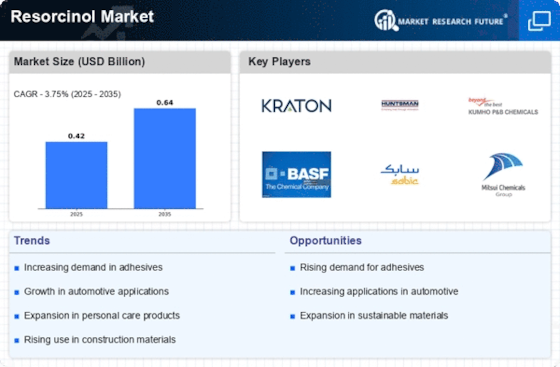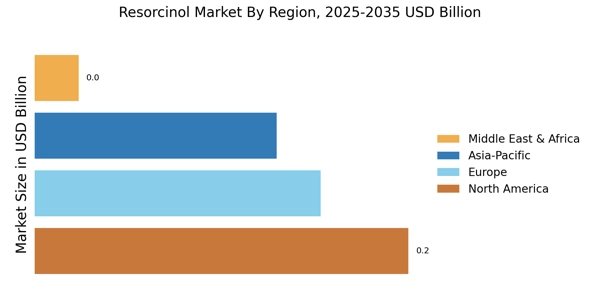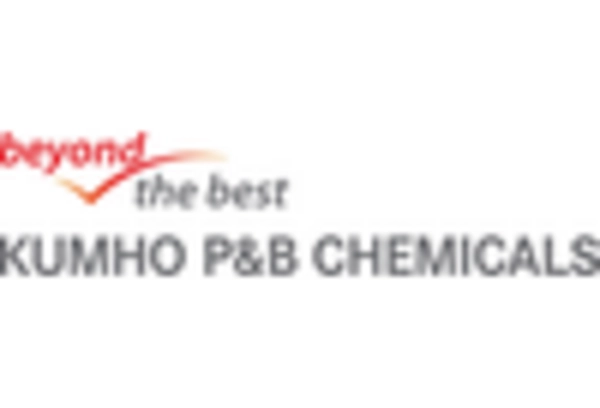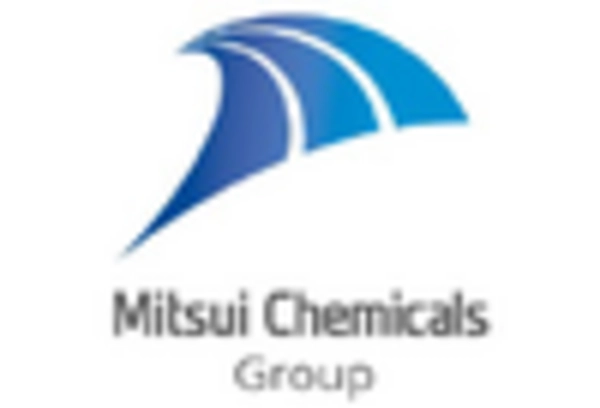Expansion in the Rubber Industry
The Resorcinol Market is significantly influenced by the expansion of the rubber industry, where resorcinol is utilized as a bonding agent in the production of tires and other rubber products. The Resorcinol Market is projected to grow at a rate of around 4% annually, driven by rising vehicle production and demand for high-performance tires. Resorcinol Market enhances the adhesion between rubber and reinforcing materials, thereby improving the durability and performance of rubber products. As manufacturers increasingly focus on producing high-quality tires that meet stringent performance standards, the demand for resorcinol in rubber applications is likely to increase, contributing positively to the overall market dynamics.
Growth in Personal Care Products
The Resorcinol Market is witnessing a surge in the utilization of resorcinol in personal care products, particularly in skin care and hair care formulations. Resorcinol Market is recognized for its antiseptic and anti-inflammatory properties, making it a valuable ingredient in various cosmetic applications. The Resorcinol Market is anticipated to reach over 500 billion dollars by 2025, with a significant portion attributed to the demand for effective skin treatments. This trend indicates a growing consumer preference for products that incorporate scientifically-backed ingredients, such as resorcinol, which may enhance the efficacy of formulations. Consequently, the increasing incorporation of resorcinol in personal care products is expected to drive market growth and innovation within the industry.
Innovations in Chemical Manufacturing
The Resorcinol Market is benefiting from ongoing innovations in chemical manufacturing processes, which are aimed at enhancing production efficiency and reducing environmental impact. Advances in synthesis techniques, such as bio-based production methods, are emerging as viable alternatives to traditional petrochemical processes. These innovations not only align with sustainability goals but also potentially lower production costs, making resorcinol more accessible to various industries. As manufacturers adopt these new technologies, the market is expected to witness a shift towards more sustainable practices, which could further stimulate demand for resorcinol across multiple applications, including adhesives, coatings, and personal care products.
Rising Demand in Adhesives and Sealants
The Resorcinol Market is experiencing a notable increase in demand for adhesives and sealants, particularly in the construction and automotive sectors. Resorcinol Market is a key ingredient in the formulation of high-performance adhesives, which are essential for bonding various materials. The construction industry, in particular, is projected to grow at a compound annual growth rate of approximately 5.5%, driving the need for durable and effective bonding solutions. This trend is further supported by the automotive industry's shift towards lightweight materials, where resorcinol-based adhesives provide superior bonding strength. As manufacturers seek to enhance product performance, the reliance on resorcinol in adhesive formulations is likely to expand, thereby bolstering the overall market growth.
Increasing Regulatory Support for Sustainable Chemicals
The Resorcinol Market is likely to benefit from increasing regulatory support aimed at promoting the use of sustainable chemicals. Governments and regulatory bodies are implementing policies that encourage the adoption of environmentally friendly materials in various industries. This regulatory landscape is fostering innovation and investment in the development of sustainable resorcinol production methods. As companies strive to comply with these regulations, the demand for resorcinol derived from renewable sources may rise, potentially reshaping the market dynamics. The emphasis on sustainability is expected to drive research and development efforts, leading to new applications and enhanced market opportunities for resorcinol.

















